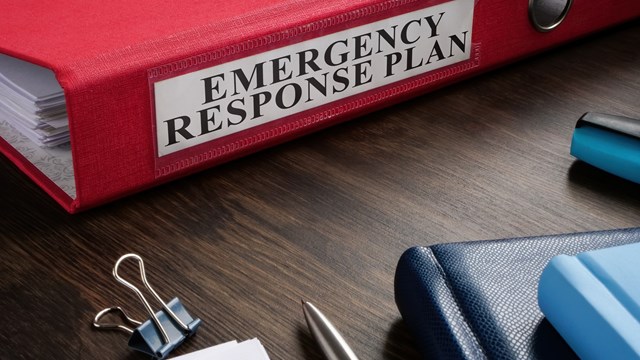
“When there is a river in your parking lot where the cars and the dumpsters are floating away, it really puts the property manager to the test to see how well he or she has planned,” says David J. Levy, PCAM, veteran property manager and president of Sterling Services in Holliston, Massachusetts.
For Levy, and other managers like him, building relationships with vendors and local authorities along with planning has become a way of life –one that may literally save lives in a disaster situation. “Planning, planning, planning, and setting expectations. You need to have these relationships in advance so, when there is a problem, you know who to call. Because you don't want to start rapport-building when a building is on fire,” he says.
Reliable Vendors Key
“I think you have to be flexible in the area of condo management,” concurs Linda Stearns, a vice president and portfolio manager for The Niles Company, an accredited management organization based in Quincy, Massachusetts. “First of all, you don’t know what type of disaster you’re going to be hit with. Therefore, probably the biggest and strongest thing that you need is a good set of vendors that you can rely on 24 hours a day, seven days a week. Home phones, personal phones. You need all those type of things because, when something hits, you need to be able toget a team together to start to resolve the problem.”
With nearly sixty years of combined experience, Levy and Stearns are among hundreds of property managers who have learned emergency preparedness lessons the hard way. And with the recent spring floods throughout much of New England – the worst in centuries for some areas – surely many more have been added to their ranks. “I think [disaster planning is] probably one of the very important things that we shoulddeal with,” says Stearns, “because it’s a reality today.”
Yet, with resolving problems – often immediate ones – as a way of life for condo managers, many aspects of disaster planning can easily slip through the cracks. And with potential problemsranging from natural disasters to terrorism, emergency preparedness may seem a daunting task for already overtaxed associations.
Some condo management companies such as Niles do offer emergency planning and response for hire, but budgeting for such services may not always be possible in tight financial times. “If you’re talking about perfection, it is always ideal to have a third-party dispassionate expert give you advice,” notes Levy. “But most condominiums have limited budgets where they’re unable to make the reserve payment and do their painting, their roof replacement, their landscaping, their snow plowing, and then have extra funds fora consultant. So, in a perfect world, absolutely a consultant makes sense for disaster planning like a consultant for interior design.” Yet with most properties lacking necessary funding for such professional consultants, managers, says Levy, must often be both “creative and clairvoyant” in preparing for the unexpected.
Bulleted Plans
The good news, say the experts, is that a simple straightforward, bulleted plan may be enough for most associations. At Levy’s Sterling Services, emergency plans are often in writing but rarely go beyond a basic bulleted outline. “They are not a three-inch three ring binder type of a book that you would have if you were a nuclear power plant or a medical facility. But we have an action plan for the properties for all the different types of issues.” This type of “all-hazard” planning is the most efficient solution for dealing with disaster, according to officials fromthe Federal Emergency Management Agency (FEMA).
“We always push the all-hazards plan,” explains FEMA’s Rob Pesapane, “but it's important to know the hazardsin your area. For instance, if your condo association is in a flood zone, you should have some kind of understanding of preparedness issues and dealing with floods. But the plan should be flexible, because you never know what emergency may occur.”
FEMA’s website, www.ready.gov, outlines core concepts to consider when preparing for the worst – no matter what the “worst” may be. “On that website there’s pretty much three main principles,” Pesapane notes. “Makea kit. So we want individual residents within the condo association to have a kit ready to go with certain items in it to be self-sufficient. We preach to 72 hours. Make a plan. Every resident should have an individual plan, but it’s good that the larger association have a plan that takes care of people with special needs. So have a larger plan in place. And be informed. It goes back to knowing the hazards that may affect that area.”
Individual Family Plan
“I think one of the things... for people to think about is that they need to develop their own individual family emergency plan (see sidebar), and part of that planning needs to be, ‘where can I relocate myself in the event of an emergency’,” says FEMA’s Dennis Pinkham. “And it’s good for them to consider the plan of who do I have nearby that I can count on.”
Yet, as all managers know, the level of individual owner preparedness varies widely from condo to condo. While some condominium residents may be well-prepared with family plans, most, quite likely, have given little thought to the minutiae of preparing for a disaster situation. Pet survival planning, reminds Pesapane, is one often-forgotten area – “you should have enough food for the pet just like you would a human, 72 hours self-sufficient,” –and proper planning for elderly residents is sometimes overlooked. Pinkham, FEMA’s external affairs director for New England, says infirm or immobile residents should contact condo management and local officials before a disaster occurs.
“What we’d like people to do is to self-identify and contact the [local] emergency management agency well ahead of time to begin planning for people that have disabilities and may need special attention or special care in moving them. And those types of arrangements can be worked through… usually in cooperation with the local fire or ambulance or emergency services so that they have an idea – a very good idea –of who lives where and what special attention people might need in the time of the disaster. The time that something is happening or about to happen is not the time to be doing planning.”
Elderly Need Special Plan
“You need to know your population – if your population is elderly or extremely elderly,” says Levy. “What if the elevator’s down? How do people use the building without the elevators? I don’t think we have a legal responsibility, but we have a moral obligation to create a plan that makes sense. If your plan is too academic and it’s not practical, it’s not going to help your residents.” And as Stearns notes, even “a three-day heat wave could be a mini-disaster if I have an elderly person who for some reason has heatstroke and maybe didn’t call the office or called the office and we didn’t take care of it.”
Just as up-front emergency preparedness may save lives in a disaster, planning ahead can also ease manager/ owner tensions in a disaster’s aftermath. And in an industry where many condo dwellers are not personally insured, “setting expectations” beforehand is key. “I think it’s something like 40 percent of all the condominium owners in the United States do not have private insurance. It's a shocking number,” Levy remarks. “So when you have an event like that, they come looking to the common trust for services or financial remuneration that we’re not able to provide.”
And if complications from such matters should arise in the claims process, so-called “public adjusters” – freelance insurance negotiators who function on behalf of claimants – may be worth the added cost to condo boards. “There’s a whole genre of companies and all they do is insurance claim processing and negotiating. They’re not attorneys per se, but they are specialized negotiators. These guys, all day long, chase fires and floods and they’re experts in negotiating on your behalf,” Levy says.
Chain-of-Command
In a disaster, both FEMA officials and private sector managers agree: Creating a simple, written, bulleted plan with contact info and a well-defined chain-of-command is best.
Plan for redundancy with backup plans in place should a trustee be incapacitated or absent in time of emergency. “We preach, continuity-wise, three deep,” says FEMA’s Pesapane. “Have a three-deep backup. Obviously it’s going to be tough if it’s volunteer-based.” Make an all-hazards plan that is flexible – one that accounts for even remote possibilities. “What we want people to prepare for is the full spectrum [including] terrorism and other possible man-made incidents that happen. There’s been great concern in Boston Harbor about LNG tankers,” explains Pinkham. “There’s always concern about things that travel over the roadways and trucks and by rail lines.” Regular drills – “normally the plans fail if you don’t dry run it out,” says Pesapane – and annual reviews arefurther keys to successful emergency planning.
“There is some disaster planning built into every manager’s mind because we don’t know what’s going to happen next…. Going to take whatever comes my way and try to deal with it,” remarks Stearns, reflecting on four decades in condo management. “There’s too many ‘ifs’ in this business. I've been in this too long.”
Matthew Worley is a freelance writer and a contributor to New England Condominium magazine.






Leave a Comment